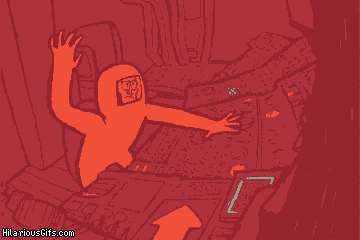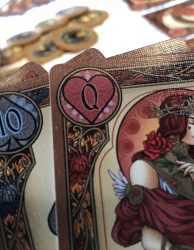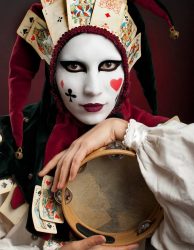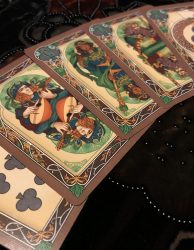
The Sound of Games, Part 1/2
The Sound of Games Part 1: Composing the Score
From creating atmosphere to driving tension, it takes skill to create a musical score that both compliments and enhances the game without breaking the gameplay immersion. Games Omniverse Composer and Sound Designer, Andre Bissonnette, is doing just that. I had the pleasure of asking Andre about his work and what it’s like to create musical scores for Danika Dire.
Heather Reid: One aspect I love most about video games is how music enhances the atmosphere and mirrors the emotional tones in games. How do you go about creating a score that will enhance the atmosphere and hit the right emotional notes, but doesn’t distract from the gameplay?
Andre: That’s a hard question to answer. I want to say something like, “I dunno, you just do it,” but that’s incredibly unsatisfying. Sometimes it looks like this:
For me, it comes from knowledge of music history, reading the script and getting cues, and again, referencing the art. Basically you compose your music as organically as you can, and then as you play the scene in the game. If the music pulls you out, make changes, and if the music isn’t noticeable or imperceptible or just plain boring, you make changes again, until you’ve really solidified what meshes well with the scene. The most important thing to keep in mind is that what makes gaming unique is that the player is what progresses the narrative, and your music should always reflect that without getting in the way.
Heather Reid: What’s been the most challenging aspect of composing for Danika Dire so far and how did you overcome that challenge?
Andre: The natural tendency is to add too much. Currently, I am redoing the main theme of the game because it no longer fits the environment it’s in. It’s a little bit too present and harsh. When Dani arrives, she’s alone in the mansion, but currently there are too many instruments and layers. The music isn’t reflecting the scene and needs to be simplified. So, one thing that I’ve found challenging is modifying and molding the music as the game molds itself. Game creation isn’t static, and things are always being tweaked and changed, so if you don’t change your music with the scene, it’ll stand out and completely take the person out of the environment.
Heather Reid: Where do you draw your inspiration for Danika Dire? Do you start with concept art or think about the story arc of the game while composing? Or do you take a different approach?
Andre: Concept art is nice, but I normally think of the scene Dani is in, and then compose the music. Once the scene gets more working pieces, be it colored art, game mechanics, game play, animation, etc, then the music will change to reflect that. Obviously, my training is in symphonic writing, so that’s normally my starting point, but it evolves from there as the scene develops. Some characters have their own theme that can be worked into a scene, some scenes relate to each other so the music should reflect that. Those are also elements I consider when composing.
Heather Reid: Briefly touch on the technical side of developing audio for a game. What does a typical session look like for you when working on game effects?
Andre: I like to look at the environment first, to get a context for the scene. Then, I like to look at where in the timeline this scene happens. What is the history of the scene? Will we come back to it later? Lastly, I’ll look into what’s going on in that scene specifically. Once I have all that data, I write. Some pieces get finished in 45 minutes, with all their working parts ready to go; others take multiple drafts and tweaks depending on if anything in the script or environment changes. I use a host of software to make my music. Pro Tools, Sibelius, FL Studio, Native Instruments … the list goes on and on. I always start by writing out a score though, in classical notion with a typical symphonic orchestral set up.
Heather Reid: What are some of your favorite game/movie scores?
Andre: Shadow of the Colossus is amazing. Journey and Bastion are also somewhere at the top of my list. Those games are really great in their scores. I’ve been playing a lot of Witcher 3 these days and I really like the music in Skellige. Team Fortress 2 has some really excellent music as well. It’s so perfectly fitting for their game. For 8 bit stuff, I really liked VVVVVV and Shovel Knight. Oh and of course, Scott Pilgrim‘s music was great. It’s hard to go wrong with Anamanaguchi. I could go on like this forever. GRANT KIRKHOPE DONKEY KONG RAP! If you don’t like that song, you’re wrong and I’ll fight you.
Heather Reid: Who are some of your favorite musicians?
Andre: Man… there’s a lot. Are we talking about bands or people? I like Parov Stelar and Caravan Palace a lot. I like The Black Keys. I like Anamanaguchi, Muse, Tom Waits, and whoever the guy is that wrote Come on and Slam from Space Jam. I like my parody bands like Ninja Sex Party, Tenacious D, and Flight of the Conchords. I like a Swedish band called Movits!, I like the Hungarian Irish Punk Rock band called Paddy and the Rats. I like Daft Punk. I like my Indie bands like Driftless Pony Club. I like this Ska band from Japan, cleverly named Tokyo Ska Paradise Orchestra… the list can go on for days and days. Oh, I should mention, some game composers I really like are Mike Morasky from Valve, Grant Kirkhope from Rare and a few other places, Darren Korb of Bastion fame, Marcin Przybyłowicz and Mikolai Stroinski Percival from CD Projekt RED, and Austin Wintory of Journey and Monaco. The list goes on but I’ll cap it there.



